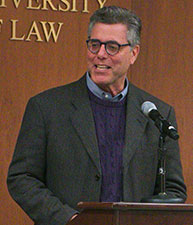The Hays Program celebrates its 60th anniversary
What is progressive lawyering supposed to look like? That was the question posed by Steven Shapiro, former National Legal Director of the American Civil Liberties Union and an adjunct professor at NYU Law, in his keynote address on October 27 commemorating the 60th anniversary of the Arthur Garfield Hays Civil Liberties Program.
In answering that question, Shapiro cited the late Frederick I. and Grace A. Stokes Professor of Law Norman Dorsen, a champion of civil liberties and director of the Hays Program. Led by Dorsen for 56 of its 60 years, the Hays Program has helped train generations of public interest lawyers through the fellowships it awards to NYU Law students. “In the long run, if we’re going to change the world, we’re going to have to create institutions that allow us to change the world,” Shapiro said, adding that “Norman was nothing if not an institution builder.”
Shapiro discussed some of the challenges now facing the ACLU and progressive lawyering in general, including a US Supreme Court that is likely to have a conservative majority for decades to come. Progressives must play the long game, he argued. “One of the great things about the Hays Program is being able to look down that list [of alumni] and look across this room and see generations of people and know in fact that the torch can be passed and the torch is being passed,” Shapiro said.
Following his speech, a panel that included Anjana Samant ’00, assistant attorney general in the Civil Rights Bureau of the New York State Attorney General’s Office; Gabriel Arkles ’04, senior staff attorney with the ACLU's LGBTQ and HIV project; Susan Shin ’06, legal director at the New Economy Project; and Ian Vandewalker ’08, senior counsel for the Brennan Center for Justice, discussed race through the lens of the Muslim travel ban, economic justice, and voting rights. In a second panel, Lizzy Seidlin-Bernstein ’09, an attorney with Ballard Spahr’s media and entertainment group; Adam Murphy ’17, a lawyer with the Equal Justice Initiative; Judy Rabinovitz, senior attorney with the ACLU Immigrants’ Rights Project; and Kate Watson ’92, senior counsel to the Women’s Reproductive Rights Project of the ACLU in Illinois, covered topics that included media law and press freedom, criminal justice, immigration detention policies, and issues of reproductive freedom.
Selected remarks:
Steven Shapiro: “Emerson said that free speech is a safety valve. If you allow the bad guys to talk, then at least we know who they are. They blow off steam and they don't blow up buildings. I think maybe that was once true, but no longer as clearly true in a world with social media, where the danger of allowing the open expression of hate speech on social media enables thousands of people to find each other and gather in Charlottesville. Maybe it's four decades of ACLU DNA, but at the end of the day, I am still on the free speech side of this battle. I’m not willing to cede to the government the power to censor even hateful ideas.”
Anjana Samant: “In terms of the theme of history repeating itself, I think one of the things to keep in mind, and that I find really stark, is that even with Dred Scott—a case about family separation, pursuant to slavery—I feel like we’re actually living in this crazy era where all those exact same issues are coming to a head.…This whole struggle for who we are as a country, who a U.S. citizen is, whether legally and on paper, or visually, is highly contested, and we’re seeing the same arguments that were made more than a hundred years ago being put forward again both in policy and in the press.”
Lizzy Seidlin-Bernstein: “An example of selective enforcement is threatening to block the merger between CNN's parent company, Time Warner, and AT&T because of CNN's reporting, which the president is not a big fan of. I am not an antitrust lawyer. I have no opinion as a lawyer about whether the AT&T-Time Warner merger should've gone through. But it is very disturbing to think that the president would be taking enforcement action because of hostility to the press, based on the content that it's putting out.”
Adam Murphy: “Even as this wonderful civil rights legislation was being passed [during the 1960s], the foundation for mass incarceration was being laid. Being a lawyer doesn't only mean knowing the law. Being a lawyer means being a student of history, it means being a truth-teller, and sometimes it means taking a step back and letting the people most directly affected by the ordeal of incarceration tell their story.”
Posted December 18, 2018
Watch video of this event:


